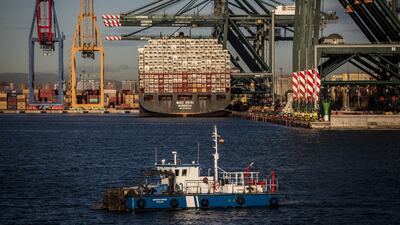Nineteen countries have signed up to a new deal to create zero-emission maritime routes to reduce the effects of the heavily polluting shipping industry on global warming.
The Clydebank Declaration, signed at the Cop26 climate change talks in Glasgow, aims to establish six “green corridors” by the middle of the decade.
Among the initial options for the initiative are routes that run from Saudi Arabia to India and China – but those three countries were not among the signatories of the deal.
The agreement includes an ambition to "scale activity up in the following years" through "more routes, longer routes and/or having more ships on the same routes".
Shipping accounts for about 3 per cent of global greenhouse gas emissions. Most ships run on the most polluting type of fuel and can remain in service for decades, hampering efforts to limit their effects on the environment.
Experts said ships have the potential to be retrofitted so they can run on zero-carbon fuels. Reducing speeds across the oceans can also reduce the effects of emissions.
The fuels of the future are likely to be a combination of hydrogen, ammonia, or electricity from renewable sources, but the maritime industry said many technical questions have not yet been resolved.
“By 2030, we need at least 200 zero-emission ships in deep-sea shipping routes and at least 5 per cent of the world fleet to be well-to-wake green,” UK Shipping Minister Robert Courts said at an event to launch the declaration.
The target marks an escalation of previous plans. The International Energy Agency said low and zero-carbon fuels would make up less than 3 per cent of shipping’s total energy consumption by 2030 and about 33 per cent by 2050.
The UN's International Maritime Organisation (IMO) is currently aiming for a 50 per cent cut in greenhouse gas emissions from the global fleet by 2050, compared with 2008 levels.
A report by the IMO last year found that shipping produced one billion tonnes of carbon dioxide in 2018.
But the International Chamber of Shipping, which represents 80 per cent of the global shipping industry, committed to a more ambitious target of reducing carbon emissions to net zero by the same date.
Critics have been unconvinced by plans to introduce 200 zero-emission ships to a global fleet of about 50,000 vessels, but Benny Engelbrecht, Denmark's Transport Minister, said he hoped the development of the green corridors would lead to broader change.
“If the shipping sector were an independent country, it would be the sixth largest emitter in the world,” he told the summit.
“Green corridors could be the tipping point for the development of the green maritime solutions.”
The declaration has set out various ways of supporting zero-emission shipping routes, including establishing partnerships between ports, operators and others to accelerate the decarbonisation of the shipping sector and its fuel supply.
Ten of the signatories are from Europe, including the UK, France, Norway and Germany. It also includes the US and Australia and the Marshall Islands, the third largest maritime emitter by flag state, according to Statista. Panama and Liberia, the top two emitters based upon where ships are registered, are not part of the deal.
Ingrid Irigoyen, associate director for ocean and climate at the Aspen Institute think tank, said establishing zero-carbon shipping corridors was "a clear and necessary next step".
“Having this group of governments ready and eager to support those efforts is extremely helpful,” she said.
The shipping industry has said the lack of government investment in research and development has been the greatest obstacle to the sector’s attempt to cut emissions.
The sector was not part of the Paris Agreement in 2015 and the global nature of shipping has meant it is difficult to regulate, said Christian Brand, an associate professor in transport at the University of Oxford.
The sector “is projected to represent up to 10 per cent of all global emissions by 2050 if left unchecked", he wrote in The Conversation.


